Table of Contents
Football has long been more than just a game; it is a multi-billion-pound industry driven by wealthy owners who invest heavily in clubs.
As the sport continues to grow globally, billionaire investors have made their mark, transforming clubs into powerhouses through financial backing.
In 2025, football club ownership remains a battleground for the world’s wealthiest individuals and organisations.
From private investors to sovereign wealth funds, these owners shape the competitive landscape of the sport. This article ranks the top 10 richest football club owners in 2025, detailing their net worth, clubs, and influence.
The Growing Influence of Billionaire Club Owners
The financial landscape of football has been reshaped by billionaire owners who invest heavily in clubs.
Their influence extends beyond player acquisitions, impacting stadium developments, training facilities, and global branding. Some key factors driving billionaire investment in football include:
- Global commercial opportunities – Football clubs generate revenue through sponsorships, broadcasting rights, and merchandise sales.
- Status and influence – Owning a football club provides global recognition and a platform for expanding business interests.
- Competitive dominance – Financial backing allows clubs to attract top talent and compete at the highest level.
The Financial Fair Play (FFP) regulations introduced by UEFA aim to control excessive spending, but billionaire-backed clubs continue to find ways to stay within the rules while strengthening their squads.
Top 10 Richest Football Club Owners in 2025
10. Dietmar Hopp (TSG Hoffenheim) – £5.8bn
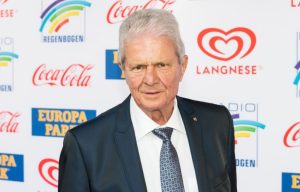
Image – Source
Dietmar Hopp is one of the most influential figures in German football ownership. As the co-founder of SAP, a global software company, he has used his wealth to transform TSG Hoffenheim from a small club into a competitive Bundesliga side.
How Dietmar Hopp Built Hoffenheim?:
- Hoffenheim was a lower-league club until Hopp invested millions into their development.
- His funding led to the construction of the Rhein-Neckar-Arena, a modern stadium completed in 2009.
- Hopp focused on youth development, investing heavily in training facilities and scouting networks.
Controversies and Challenges:
- His deep financial involvement has been criticised, as it challenges Germany’s 50+1 ownership rule, which limits private investors’ control over clubs.
- Hoffenheim’s rise, funded largely by Hopp’s wealth, has sparked debates on the role of billionaires in football.
Despite criticism, Hoffenheim remains a model of financial stability, showing how smart investment and infrastructure can elevate a club’s standing.
9. Joe Lewis (Tottenham Hotspur) – £6.20bn
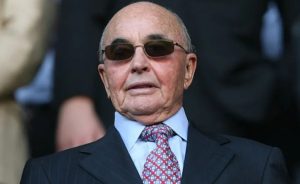
Image – Source
British billionaire Joe Lewis has played a crucial role in shaping Tottenham Hotspur’s modern identity. As the owner of ENIC Group, he took control of the club in the early 2000s, overseeing a transformation that turned Spurs into a European football powerhouse.
Financial Growth Under Joe Lewis:
- Oversaw the construction of the Tottenham Hotspur Stadium, one of the most advanced stadiums in the world.
- Focused on a self-sustaining business model, ensuring the club operates without excessive external funding.
- Helped Tottenham establish itself as a regular top-four contender in the Premier League.
Challenges and Fan Criticism:
- Tottenham fans have often criticised Lewis and ENIC for their conservative transfer spending, especially compared to rival clubs like Manchester City and Chelsea.
- In 2023, Joe Lewis faced legal issues in the United States, which led to changes in his direct control over Spurs.
- Despite financial success, Tottenham has struggled to win major trophies, increasing pressure on ownership.
Joe Lewis’ legacy at Tottenham is one of financial stability and modernisation, but the lack of silverware remains a point of contention among supporters.
8. Nasser Al-Khelaifi (Paris Saint-Germain) – £6.20bn
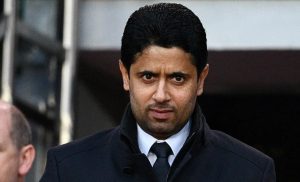
Image – Source
Nasser Al-Khelaifi, as the chairman of Qatar Sports Investments (QSI), has turned Paris Saint-Germain (PSG) into one of the biggest clubs in the world. Since QSI’s takeover in 2011, PSG has dominated French football and become a global brand.
How QSI Changed PSG?:
- Signed world-class players, including Lionel Messi, Neymar, and Kylian Mbappe, bringing international attention to the club.
- Heavily invested in PSG’s commercial growth, turning it into one of the most valuable football brands globally.
- PSG’s dominance in Ligue 1 has been unparalleled, winning multiple league titles.
Financial Fair Play and European Ambitions:
- PSG’s spending has often come under Financial Fair Play (FFP) scrutiny, as UEFA closely monitors its transfer expenditures.
- Despite heavy investments, PSG has struggled to win the UEFA Champions League, falling short on multiple occasions.
- Al-Khelaifi also serves as the chairman of the European Club Association (ECA), influencing UEFA’s decisions on financial regulations.
Despite challenges in European competitions, PSG remains one of the most financially powerful clubs in the world, thanks to Al-Khelaifi’s leadership and Qatar’s continued investment.
7. Stan Kroenke (Arsenal) – £6.29bn
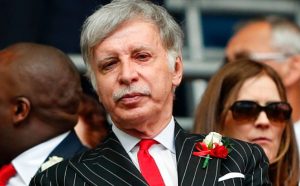
Image – Source
Stan Kroenke, an American billionaire and owner of Kroenke Sports & Entertainment (KSE), has owned Arsenal for over a decade. His tenure has seen both financial growth and fan unrest, as the club transitioned into a self-sustainable business model.
Arsenal’s Transformation Under Kroenke:
- Arsenal moved to the Emirates Stadium in 2006, significantly increasing matchday revenue.
- KSE’s approach has focused on long-term financial sustainability, rather than reckless spending.
- Over the past few seasons, Arsenal has returned to competitive form under Mikel Arteta, leading to optimism among fans.
Criticism and Fan Protests:
- Arsenal supporters have criticised Kroenke for his passive ownership style, often comparing it to more involved owners like Sheikh Mansour at Manchester City.
- The club’s failure to win major trophies between 2004 and 2020 led to increased frustration among fans.
- In 2021, KSE faced backlash for supporting the European Super League, which was widely opposed by fans.
Despite past controversies, Arsenal’s recent success and increased transfer spending suggest that Kroenke is adapting to the demands of modern football ownership.
6. Shahid Khan (Fulham) – £9.7bn
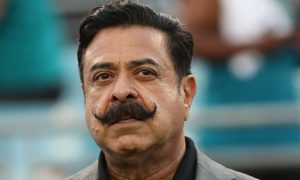
Image – Source
Shahid Khan, an American-Pakistani billionaire, owns Fulham FC and the Jacksonville Jaguars (NFL). Under his leadership, Fulham has maintained a stable position in English football, moving between the Premier League and Championship.
Khan’s Investments in Fulham:
- Funded the redevelopment of Craven Cottage, modernising the stadium while preserving its historic character.
- Committed to making Fulham a long-term Premier League club through careful spending and smart recruitment.
- Unlike other billionaire owners, Khan has taken a measured approach, avoiding reckless investments.
Challenges and Future Goals:
- Fulham has struggled to break into the top half of the Premier League, often being involved in relegation battles.
- Balancing investments between his NFL team and Fulham has been a challenge, leading some fans to question his full commitment to football.
- Despite financial stability, Fulham lacks the financial power to compete with the Premier League’s elite clubs.
Khan remains a respected owner, known for his strategic decision-making and commitment to the club’s long-term sustainability. However, Fulham’s struggle to consistently compete at the highest level remains a concern.
5. Philip Anschutz (LA Galaxy) – £10.5bn
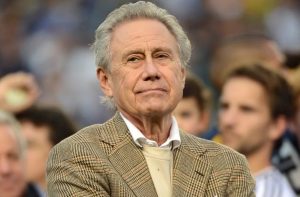
Image – Source
Philip Anschutz, an American billionaire and one of the founding figures of Major League Soccer (MLS), owns LA Galaxy, one of the most successful clubs in North America. His role in shaping football in the United States has been instrumental in making the sport more commercially viable.
Anschutz’s Influence on MLS and LA Galaxy:
- Played a critical role in establishing Major League Soccer in 1996, at a time when professional football in the U.S. was struggling to gain traction.
- Previously held stakes in Chicago Fire, Colorado Rapids, Houston Dynamo, and D.C. United, helping to build the foundation of the league.
- Helped secure David Beckham’s move to LA Galaxy in 2007, a landmark signing that boosted MLS’s global reputation and led to the creation of the Designated Player Rule (also known as the Beckham Rule).
Challenges and Future of LA Galaxy:
- While LA Galaxy remains a dominant force in MLS, the emergence of new teams like Inter Miami and LAFC has intensified competition.
- Anschutz has adopted a long-term investment strategy, focusing on youth development and infrastructure.
- With football’s growing popularity in the U.S., LA Galaxy is positioned as a key club in the run-up to the 2026 FIFA World Cup, which will be hosted in North America.
Anschutz’s legacy extends beyond LA Galaxy, as his early investments helped establish MLS as a stable and profitable league.
4. David Tepper (Charlotte FC) – £14.6bn
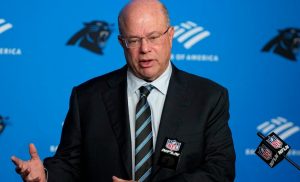
Image – Source
David Tepper, a hedge fund billionaire and one of the wealthiest sports owners in the U.S., entered football ownership with Charlotte FC, a club competing in Major League Soccer. While Charlotte FC is still a relatively new team, Tepper’s financial strength has given the club a solid foundation for long-term success.
Tepper’s Vision for Charlotte FC:
- Also owns the Carolina Panthers (NFL), making him a dominant sports figure in the Carolinas.
- Purchased Charlotte FC’s MLS franchise rights for $325 million, a record fee at the time, demonstrating his commitment to football’s growth in the U.S.
- Focuses on a data-driven management approach, using analytics to guide recruitment and performance strategies.
Challenges for a New MLS Club:
- Charlotte FC faces the challenge of competing with more established MLS teams that have deeper histories and fan bases.
- The club has struggled to attract high-profile signings, unlike teams such as Inter Miami, which secured Lionel Messi.
- Building a football culture in a traditionally American football-dominated region remains a long-term challenge.
Despite these challenges, Tepper’s wealth ensures that Charlotte FC has the financial backing needed to compete in MLS for years to come.
3. Sir Jim Ratcliffe (Manchester United) – £21.6bn

Image – Source
Sir Jim Ratcliffe, the billionaire chairman of INEOS, became a significant shareholder in Manchester United, marking the beginning of a new era for the club.
His investment was a major turning point following years of criticism directed at the previous owners, the Glazer family.
How Ratcliffe is Reshaping Manchester United?:
- Attempted to purchase Chelsea in 2022 before shifting his focus to United.
- Acquired a minority stake in Manchester United in early 2024 but secured control over the club’s sporting operations, including transfers and infrastructure.
- Plans to redevelop Old Trafford, modernising the stadium to enhance the club’s commercial appeal.
Challenges and Expectations:
- Fans have high expectations for Ratcliffe to restore Manchester United’s dominance in the Premier League and Champions League.
- Competes against financially superior clubs such as Manchester City and Newcastle United, which are backed by state-owned funds.
- Needs to rebuild trust with fans after years of poor management under the Glazers.
With his vast wealth and business expertise, Ratcliffe has the financial resources and strategic vision to elevate Manchester United back to the top of world football.
2. Sheikh Mansour (Manchester City) – £24.4bn
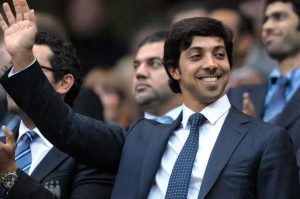
Image – Source
Sheikh Mansour, a member of the Abu Dhabi royal family, has been the driving force behind Manchester City’s dominance in English and European football. Since purchasing the club in 2008, his financial backing has transformed City into one of the most successful teams in the modern era.
Manchester City’s Transformation Under Sheikh Mansour:
- Invested over £1.5 billion into the club, funding world-class player signings, infrastructure, and academy development.
- Built City Football Group (CFG), a multi-club ownership model that includes teams in New York, Melbourne, Mumbai, and other cities.
- City has won multiple Premier League titles, domestic trophies, and a historic UEFA Champions League title in 2023.
Financial Power and Controversies:
- Sheikh Mansour’s investment has led to criticism, particularly concerning Financial Fair Play (FFP) regulations.
- Manchester City has faced legal challenges from the Premier League regarding financial irregularities, though the club denies wrongdoing.
- Some critics argue that state-backed ownership creates an unfair competitive advantage over traditional club models.
Despite controversies, Manchester City remains one of the most dominant football teams in the world, and Sheikh Mansour’s financial support ensures continued success.
1. Public Investment Fund (Newcastle United) – £478bn
The Public Investment Fund (PIF) of Saudi Arabia is the richest football club owner in the world, with assets exceeding £478 billion. Since acquiring Newcastle United in 2021, PIF has dramatically transformed the club, making it a serious contender in European football.
Newcastle United’s Transformation Under PIF:
- The takeover ended Mike Ashley’s ownership, which was marked by lack of investment and fan dissatisfaction.
- Newcastle quickly became one of the biggest spenders in the Premier League, signing top-quality players and improving facilities.
- The club secured Champions League football for the first time in two decades, marking a rapid rise under new ownership.
Controversies and Future Challenges:
- PIF’s involvement has raised ethical concerns due to Saudi Arabia’s human rights record and accusations of sportswashing.
- The club faces scrutiny from UEFA and the Premier League over state-backed financial influence.
- Despite massive investments, competing with Manchester City, Real Madrid, and other elite clubs remains a challenge.
Newcastle United, backed by the wealth of Saudi Arabia’s sovereign fund, is on a path to becoming a global football powerhouse, with financial resources unmatched by any other club.
| Rank | Owner | Club | Net Worth (£) |
| 1 | Public Investment Fund (PIF) | Newcastle United | £478bn |
| 2 | Sheikh Mansour | Manchester City | £24.4bn |
| 3 | Sir Jim Ratcliffe | Manchester United | £21.6bn |
| 4 | David Tepper | Charlotte FC | £14.6bn |
| 5 | Philip Anschutz | LA Galaxy | £10.5bn |
| 6 | Shahid Khan | Fulham | £9.7bn |
| 7 | Stan Kroenke | Arsenal | £6.29bn |
| 8 | Nasser Al-Khelaifi | Paris Saint-Germain | £6.20bn |
| 9 | Joe Lewis | Tottenham Hotspur | £6.20bn |
| 10 | Dietmar Hopp | TSG Hoffenheim | £5.8bn |
What is the Role of Wealth in Modern Football?
The involvement of billionaires and sovereign wealth funds in football raises ongoing debates about financial disparity and competition balance.
- Does wealth guarantee success? While financial backing helps, smart management and player development remain crucial.
- Impact on traditional clubs – Smaller, historic clubs often struggle to compete financially.
- Fan influence vs billionaire ownership – Some argue that clubs should remain fan-owned to maintain football’s cultural heritage.
- Future of Financial Fair Play (FFP) – UEFA and FIFA continue adjusting regulations to prevent excessive spending.
The presence of billionaire owners in football will remain a defining aspect of the sport, influencing league structures, transfer policies, and global competitions. As the landscape evolves, financial power will continue to be a driving force in shaping football’s future.
Conclusion
The richest football club owners in 2025 continue to shape the future of the sport. With billion-pound investments, these individuals and entities influence the success of their respective clubs, whether through infrastructure improvements, player acquisitions, or global marketing.
While financial power is crucial, success in football still depends on smart management, player development, and tactical expertise.
As football continues to evolve, the role of billionaire ownership will remain a central topic of discussion in the years to come.
FAQs About Richest Football Club Owners
Who is the richest football club owner in 2025?
The Public Investment Fund (PIF), which owns Newcastle United, is the wealthiest football club owner in 2025, with an estimated worth of £478bn.
How does club ownership affect a team’s performance?
Wealthy owners provide financial stability, improve infrastructure, and enable top player signings, often leading to better on-field performances.
Why do billionaires invest in football clubs?
Football clubs offer branding opportunities, commercial revenues, and a way to expand business influence in global markets.
Which football clubs are owned by state-backed funds?
Newcastle United (Saudi Arabia’s PIF), Manchester City (Abu Dhabi), and PSG (Qatar Sports Investments) are examples of state-backed ownership.
Are billionaire-owned clubs more successful?
Financially powerful clubs often perform well, but success also depends on managerial strategy and player development.
What is the impact of Financial Fair Play on rich club owners?
Financial Fair Play (FFP) regulations limit excessive spending to ensure fair competition and prevent clubs from operating beyond their financial means.
Can fans buy shares in their favourite football clubs?
Some clubs, like Bayern Munich, offer fan ownership models, while others, like Manchester United, have shares available for public purchase.


